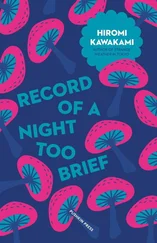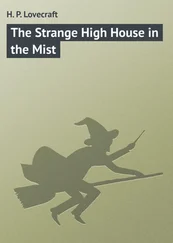Satoru and Toru were both mesmerized by Sensei, who had just uttered the statement, “Actually, the woman who used to be my wife once ate a Big Laughing Gym mushroom.”
“What do you mean, ‘the woman who used to be my wife’?”
“I mean my wife who ran off about fifteen years ago,” he said, his voice as serious as ever.
I gave out a little cry. I had assumed that Sensei’s wife had died. I expected Satoru and Toru to be just as surprised, but they both seemed unfazed. As he sipped the rest of his mushroom soup, Sensei told us the following story:
My wife and I often went hiking. We usually hiked smaller mountains, places that were about an hour’s train ride away. Early Sunday mornings, we’d take along a lunch my wife had packed for us and board the train, still empty at that hour. My wife had a book she loved called Suburban Hiking for Pleasure . On its cover, there was a photo of a woman climbing a mountain with a walking stick, wearing leather hiking boots, knickerbockers, and a hat with a feather tucked into it. My wife had re-created this exact outfit—down to the walking stick—and she would wear it on our hiking trips. This is just ordinary hiking, I would say to her, You don’t need to be so formal about it. But she would reply, impervious to me, It’s important to dress the part. She wouldn’t break character, even on a trail where people were walking around in flip-flops. She was a very hardheaded person.
This must have been when our son was in elementary school. The three of us were on one of our usual hiking trips. It was exactly the same time of year as now. It had been raining, and the mountain’s fall foliage was beautiful, although many of the brilliantly colored leaves had been scattered by the rain. I was wearing sneakers and had fallen down a couple of times when they got stuck in the mud. My wife had no trouble walking in her hiking boots. But even when I fell, she refrained from making any sort of sarcastic remark. She may have been stubborn, but she did not go in for cattiness.
After walking for a while, we took a break and each had two honeyed lemon slices. I’m not particularly fond of sour sweets, but my wife insisted that honeyed lemon went together with mountain hiking, so I didn’t bother to argue. Even if I had, I doubt it would have bothered her, perhaps it would just have contributed to the subtle accumulation of anger—the way a succession of smaller waves accumulate into one big wave—that rippled throughout everyday life in unexpected places. That’s just the way married life is, I suppose.
Our son liked lemon even less than I did. He put the honeyed lemon in his mouth and then stood up and walked into a thicket of trees. He liked to pick up autumn leaves from the ground. The boy had a refined sensibility. I followed him to pick up some leaves myself, but when I got closer, I saw that he was stealthily digging a hole in the ground. He hastily dug a shallow hollow, hurriedly spit out the lemon in his mouth, then swiftly filled in the hole with dirt. That’s how much he disliked lemon. He wasn’t the kind of child who wasted food either. My wife had raised him well.
You must really hate it, I said to him. He was a bit startled, but then nodded silently. I’m not very fond of it either, I said, and he smiled with relief. Our son looked a lot like my wife when he smiled. He still looks a lot like her. Come to think of it, he will soon be fifty years old, the same age my wife was when she ran off.
The two of us were crouched over, busying ourselves with collecting autumn leaves when my wife walked up. Even though she was wearing those huge hiking boots, she didn’t make a sound. Hey there, she said behind our backs, and we both flinched with surprise. Look what I found—a Big Laughing Gym mushroom, she whispered in our ears.
THE FOUR OF us had quickly finished what had seemed like plenty of mushroom soup. The combined varieties of mushrooms had mingled together and the taste was ineffable. That had been Sensei’s description—“ineffable.” In the middle of his story, he had abruptly interrupted himself to say, “Satoru, the soup’s aroma is simply ineffable.”
Satoru rolled his eyes, and Toru said, “Sensei, you sound just like a teacher!” They urged Sensei to continue the story. What happened with the Big Laughing Gym? Satoru asked, while Toru wondered, How did she know it was a Big Laughing Gym?
Besides Suburban Hiking for Pleasure , my wife had another favorite book, a little field guide to mushroom identification, like a mushroom encyclopedia—these two books were always tucked away in her rucksack whenever we went hiking. And, now, she had the guide open to the page on Big Laughing Gym mushrooms, and she kept repeating, This is it! This is definitely that kind of mushroom!
“Fine, you know it’s a Big Laughing Gym, but what are you going to do with it?” I asked her.
My wife replied, “Why, eat it, of course.”
“But isn’t it poisonous?” I said.
“Mom, stop it!” our son cried out.
Right at that moment—paying no mind whatsoever to the dirt on its cap—my wife popped the mushroom into her mouth. “It’s a little tough to eat raw,” she said, shoving a honeyed lemon slice in her mouth along with it. To this day, neither my son nor I have ever eaten another honeyed lemon slice.
What followed was quite a commotion. First our son burst into tears. “Mom is going to die!” he bawled.
“Big Laughing Gyms don’t kill you,” my wife comforted him, maintaining perfect composure.
In any case, we still needed to get off the mountain and go to a hospital, and I had to drag my reluctant wife back down the way we came.
Soon after, just around the time when we reached the foot of the mountain, the symptoms began to appear. Later at the hospital, the doctor commented nonchalantly that even such a small amount could have an effect, but, to my mind, the symptoms that she exhibited were rather remarkable.
My wife, who up until then had been so calm and collected, began to emit a sort of chortle, intermittent at first but soon growing in frequency before developing into the full-fledged so-called “laughter.” They call it laughter, but there was nothing happy or cheerful about it. It sounded as though she was trying to stifle a laugh as it welled up, but for the life of her she couldn’t hold back, and no matter how much she tried, her brain was unable to overcome the involuntary physical reaction—that’s what kind of laugh it was. An unspeakably sinister laugh, as if at some sick joke.
Our son was terrified, I was in a panic, and my wife, her eyes filled with tears, just kept on laughing.
“Cut it out, will you?” I said, as our son whimpered faintly.
“I c-can’t stop. I-It’s like my throat and my f-face and my chest—n-none of them are under my c-control,” my wife replied with difficulty, through her laughter.
I was irate. Why was it that she constantly needed to cause such trouble? We went hiking practically every weekend and, frankly, I didn’t enjoy it very much. Neither did our son. He would probably have been just as content to stay at home, painstakingly assembling his plastic models, or to go fishing in the creek by our house, or what have you. Instead, both he and I did as we were told and got up early to wander around the hills on the outskirts of town. But that just wasn’t good enough for my wife—she had to go and eat a Big Laughing Gym mushroom.
My wife was treated in the hospital, but, as the ever-nonchalant doctor said, since the mushroom’s toxin was already in her bloodstream, there was really nothing they could do about it, and her condition remained more or less unchanged after he examined her. Ultimately, my wife went on laughing until that evening. We took a taxi home and I put our son, who had worn himself out crying and had fallen asleep, under the covers in his bed. I kept an eye on my still-laughing wife as she sat alone in the living room while I made us some strong green tea. My wife drank her tea, laughing, and I drank my tea, stewing in my anger.
Читать дальше
![Хироми Каваками Strange Weather in Tokyo [= The Briefcase] обложка книги](/books/29150/hiromi-kavakami-strange-weather-in-tokyo-the-br-cover.webp)










